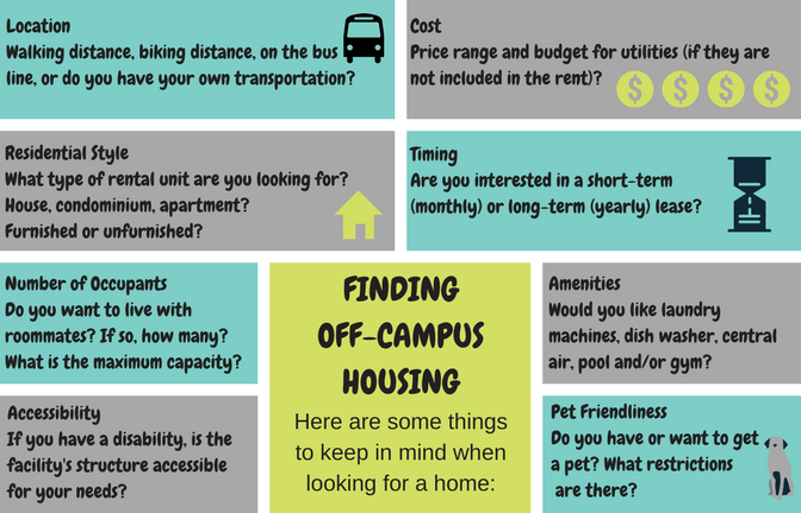Leasing or renting a place to live off-campus can be a very exciting and positive experience. However, it can also be confusing and overwhelming. The following will provide you with information and resources to help successfully navigate your off-campus experience from signing a lease to moving out and getting your security deposit back.

Housing Search Checklist
This checklist can be used when visiting potential rentals. The sections can be used to prompt questions for your landlord or while viewing the property. Identify the areas that are most important to you before you make the visit.
Helpful Information for Renting
Typical Renting Requirements
You may be asked to fill out an application and pay a fee. The landlord may also check your credit report. Some campus area landlords require a student under the age of 23 to have a co-signor (typically a parent or guardian). Once your application has been approved, you will then be asked to sign a lease. Make sure to read the lease thoroughly before signing. REMEMBER: Leases are negotiable documents, as long as you and the landlord agree to the terms and both sign off on the lease. After signing the lease, your co-signor may also be asked to sign the lease (basically this is assurance to the landlord that if the student tenants are not able to pay the rent, that they as a co-signor will be held responsible for covering the costs). Once all documents have been signed, make sure to keep a copy of EVERYTHING! Typically, after signing the lease, the landlord will ask that you pay a security deposit. The security deposit is refundable, as long as the property is returned in the same condition as it was received. Some landlords may ask for, not only the security deposit, but also the first month's rent up front.
See Leasing Information for more on Security Deposits.
Renters Insurance
When you look for a place to rent, you have a lot on your mind -- location, amenities, lifestyle, monthly payment, moving, buying furniture – but renters insurance is probably not high on the list. It should be -- many landlords require tenants to carry renters insurance and it is a good idea.
Whether you rent a room, apartment, or house, a renter’s insurance policy is highly recommended. It costs as little as $100 a year, covers your personal belongings in the case of theft and/or damage, and provides liability coverage in the event someone is injured either in your rental or on the property where your rental is located.
Splitting The Bills
When splitting the bills with roommates, have an agreement in place before you move in. You do not want to put a bill under your name and be late in payments. It will be your credit that is impacted if there is a default in payments. A tool to help divide roommate bills is called "Simple Bills."
Simple Bills
An easier way to paying your portion of the bills
Trash and Recycling
House renters may be responsible for maintaining the outdoor property and keeping it free of trash. If you do not, the town can issue citations or fines based on local ordinances.
Utilities
Electric Utilities
Eversource 1-800-286-2000
Cable, Internet and/or Phone
Charter Communications of Northeastern CT
DISH
Satellite TV, Internet and/or Phone
AT&T
AT&T / Yahoo!
AT&T DISH Network